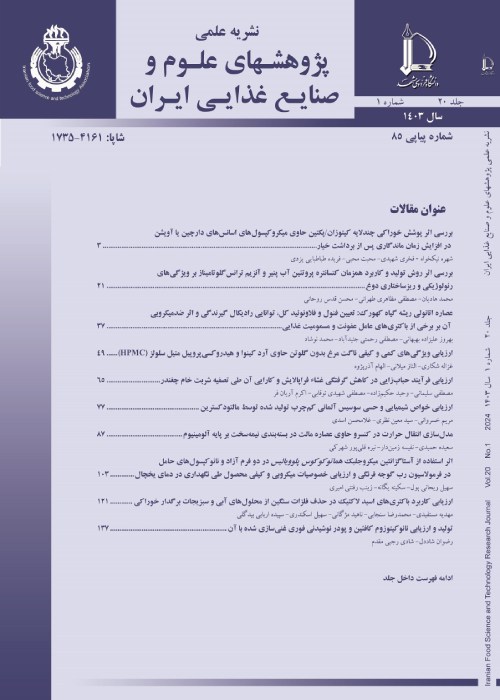Preparation of Liposomal Nanoparticles Containing Ziziphora tenuir Essential Oil and Evaluation of its Antimicrobial Effects
Author(s):
Article Type:
Research/Original Article (دارای رتبه معتبر)
Abstract:
Background and Objectives
Natural preservatives extracted from herbs are important sources for bioactive compounds that can be used in protection of food products. Essential oils are aromatic oily liquids, obtained from plant material like flowers, buds, seeds, leaves, and roots. Unfortunately, most natural compounds are biologically instable, poorly soluble in water and they distribute poorly to target sites. Currently, some novel methods have been introduced in order to improve their stability and their bioavailability, among which is the use of liposomal encapsulation. Microencapsulation reduces reactivity with the environment (water, oxygen, light), decreases the evaporation or the transfer rate to the outside environment, promotes handling ability, masks taste and enhances dilution to achieve a uniform distribution in the final product when used in very small amounts. Essential oils, as natural extracted compounds extracted from plants, are unstable compounds with low water solubility and unable to achieve target cells. Essential oils encapsulation by nanoliposomes is a novel method for increasing their biological activity and protecting them from destructive factors. The aim of this study was production and optimization of nanoliposomes containing Z. teniur essential oil and investigating their antibacterial effects against pathogens (Staphylococcus aureus and Escherichia coli).Materials and Methods
Lipid film hydration method was used to produce nanoliposomes containing Z. teniur essential oil. Soy phosphatidylcholine and cholesterol were the main wall materials and chloroform was used as the mixing solvent . The particle size of nanoliposomes and their zeta-potential were investigated using laser diffraction method. In order to determine the minimum inhibitory concentration and the minimum bactericidal concentration of Z. teniur essential oil against examined bacteria, serial dilution method was used. Also, antioxidant activity of free and nano-encapsulated essential oil of Z. teniur was determined by DPPH method.Results
According to the results, highest encapsulation efficiency achieved by using 80:20 ratio of soy phosphatidylcholine to cholesterol in nanoliposomes’ wall structures. In general, by increasing the ratio of phosphatidylcholine to cholesterol, encapsulation efficiency was improved. Zeta-potential of nanoliposomes was equal to -5.3 mv and mean particle sizes were in the range of 94.7-119.9 nm. Results indicated that essential oil ejection from nanoliposomes has direct relation to the time of storage and after 30 hours, ejection rate will increase considerably. Ejection rate was higher in phosphate buffer pH=7.4 in comparison with phosphate buffer pH=5.4. Minimum inhibitory concentration and minimum bactericidal concentration of free essential oil against Escherichia coli was 100 and 175 (µl/ml) respectively. Although, Minimum inhibitory concentration and minimum bactericidal concentration of nanoliposomes containing Z. teniur essential oil were equal to 75 and 150 (µl/ml) respectively. Also, results shown that , minimum inhibitory concentration and minimum bactericidal concentration of encapsulated Z. teniur essential oil against Staphylococcus aureus were lower in comparison with free form of Z. teniur essential oil. Staphylococcus aureus (as Gram-positive bacteria) was more susceptible than Escherichia coli (as Gram-negative bacteria).Conclusion
Encapsulation of Z. teniur essential oil by nanoliposomes led to improve antibacterial effects of essential oil against Staphylococcus aureus and Escherichia coli. Also, investigating of antioxidant activity showed that encapsulated Z. teniur essential oil in nanoliposomes was more effective than free form of Z. teniur essential oil in scavenging of DPPH free radicals. Using nanoliposome encapsulation technology can be an effective way for increasing the efficiency of natural antibacterial compounds and essential oils encapsulated in nanoliposomes are suitable alternatives for synthetic preservatives used in food industry nowadays. The use of liposomes containing Z. teniur essential oil can provide the necessary protection against growth of spoilage and pathogenic microorganisms such as Staphylococcus aureus and Escherichia coli in food products.Keywords:
Language:
Persian
Published:
Iranian Food Science and Technology Research Journal, Volume:19 Issue: 2, 2023
Pages:
231 to 245
magiran.com/p2593194
دانلود و مطالعه متن این مقاله با یکی از روشهای زیر امکان پذیر است:
اشتراک شخصی
با عضویت و پرداخت آنلاین حق اشتراک یکساله به مبلغ 1,390,000ريال میتوانید 70 عنوان مطلب دانلود کنید!
اشتراک سازمانی
به کتابخانه دانشگاه یا محل کار خود پیشنهاد کنید تا اشتراک سازمانی این پایگاه را برای دسترسی نامحدود همه کاربران به متن مطالب تهیه نمایند!
توجه!
- حق عضویت دریافتی صرف حمایت از نشریات عضو و نگهداری، تکمیل و توسعه مگیران میشود.
- پرداخت حق اشتراک و دانلود مقالات اجازه بازنشر آن در سایر رسانههای چاپی و دیجیتال را به کاربر نمیدهد.
In order to view content subscription is required
Personal subscription
Subscribe magiran.com for 70 € euros via PayPal and download 70 articles during a year.
Organization subscription
Please contact us to subscribe your university or library for unlimited access!


